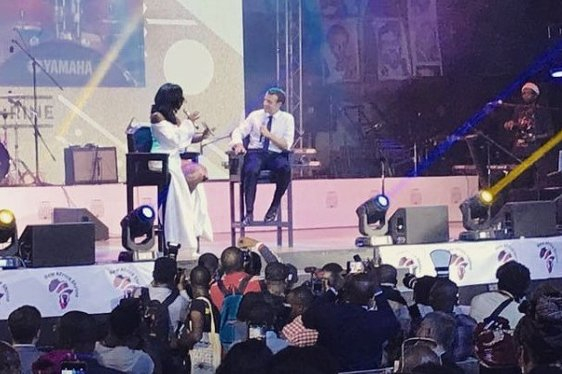Why do young Nigerians ask president Macron for advice?
I’m watching this Interactive Session between the French president and Nigerians, hosted by the Tony Elumelu Foundation (TEF) in Lagos.
Lagos is the innovation capital of Nigeria, and as is the trend these days, many future-conscious politicians and tech leaders from Macron to Zuckerberg, are gravitating away from Nigeria’s sleepy politicians to its dynamic young people. Earlier, the French president had visited a nightclub made famous by Afrobeat king Fela Kuti, and also watched a life-like portrait of him painted by an eleven-year-old boy.
So, the TEF audience is brim-full with politicians, public sector leaders, business people, entrepreneurs and TEF alumni. Questions are fired at the 'young' president, who stands at the centre of a stage, 'flagged by flags' of the EU, France & Nigeria.
Many questions are about economic issues. Some appear somewhat scripted, like they are from business class or something. There is one question about immigration, which is actually Europe's biggest interest in Africa, apart from religious extremism and extractive industries. Macron takes almost 20 minutes to answer that one.
About 8 out of 10 of the questions from the audience to Macron start with "What is your advice about..."
At least once, Macron replies: "There is no advice…"
I remember since I was a kid, one of my pet peeves was television and radio interviews. It was very common for interviewers to ask VIPs, "What advice do you have for the youths?" or "What message do you have for your fans?"
As if youths are sitting around all day just waiting to be advised. Or maybe they are. Are they?
I feel that the question suggests a mind-set. Faux deference, some inferiority, a culture of allegiances, patriarchy, classism, cowherd mentality, groupthinking, student-teacher-textbook-formatting… lack of individuality?
I feel questions can be more honest, informative, thoughtful and useful for broader conversations.
For instance, if I was interviewing Beyoncé, or Wizkid, I would ask, "Lemonade was a very politically conscious album, do you think that had an effect on its commercial success?" or "Ojuelegba feels like an autobiographical song, what made you write something so personal?"
Those sorts of questions would provoke more informative discussions than "What advice do you have?"
As children, we were probably raised to look up to other people for wisdom.
Parents. Teachers. Elders. Religious leaders. Even politicians. Even celebrities.
As if we can trust no wisdom of our own.
It is one of the reasons why we haven’t yet thought our way out of underdevelopment. Because we still think someone else has the answer.
And we tend to look up to people instead of looking in to our own selves for leadership.
The answer, my friend, is blowing in Google
Forget what Bob Dylan said: these days, the answer, my friend, is no longer blowing in the wind. It’s in Google. At your own fingertips.
Moving forward, of the many things Nigeria's young people need to learn, is that no one can advise you, lift you, help you etc. the only one who can advise you is yourself, educate yourself and build yourself - first mentally.
We also need to start asking some of the questions that were directed to Macron from our own parents, politicians, religious leaders, and other people we look up to, instead of fawning graciously at them and asking humbly, "what advice do you have...."
Advise yourself. No, question yourself, so you can question others better.
20 years ago Macron was an intern living in Nigeria. With hindsight, he can see where Nigeria is coming from. From history, he also knows that from the struggle between old traditions and new ideas, the French Renaissance began in the 15th century, and modern France was built through art, music, culture and innovation.
Today, the 40-year-old Macron is the President of The Republic. With an eye on the future, he knows where countries like Nigeria can be.
Formulating better, bolder, more incisive and table-shaking questions would be a good place to start that journey to the future.
Ayo Adene (1976) is a Nigerian-born public health specialist who has worked in more than 15 countries in 4 continents in 15 years. Whether managing programs at PharmAccess in the Netherlands, evaluating policies with UNICEF in Surinam or financing development with the Global Fund in Rwanda, Ayo writes to live, and lives to write.


